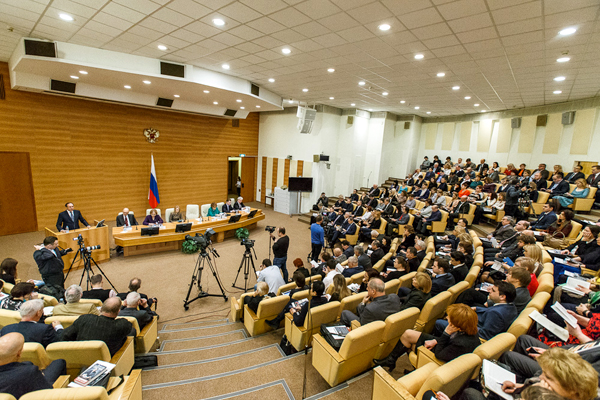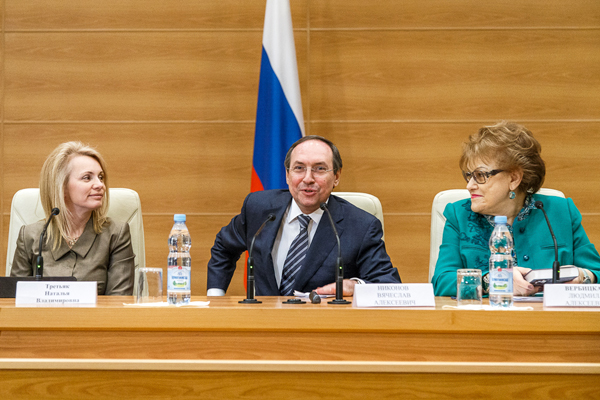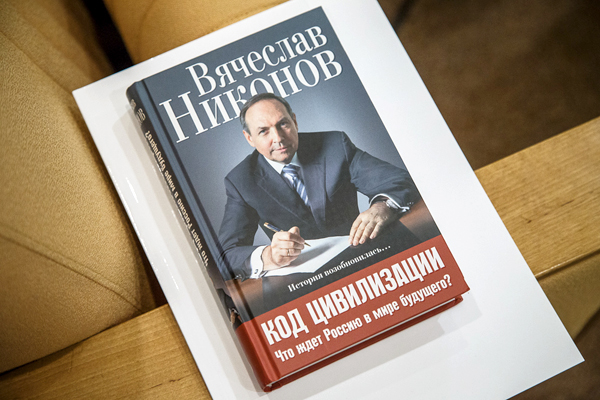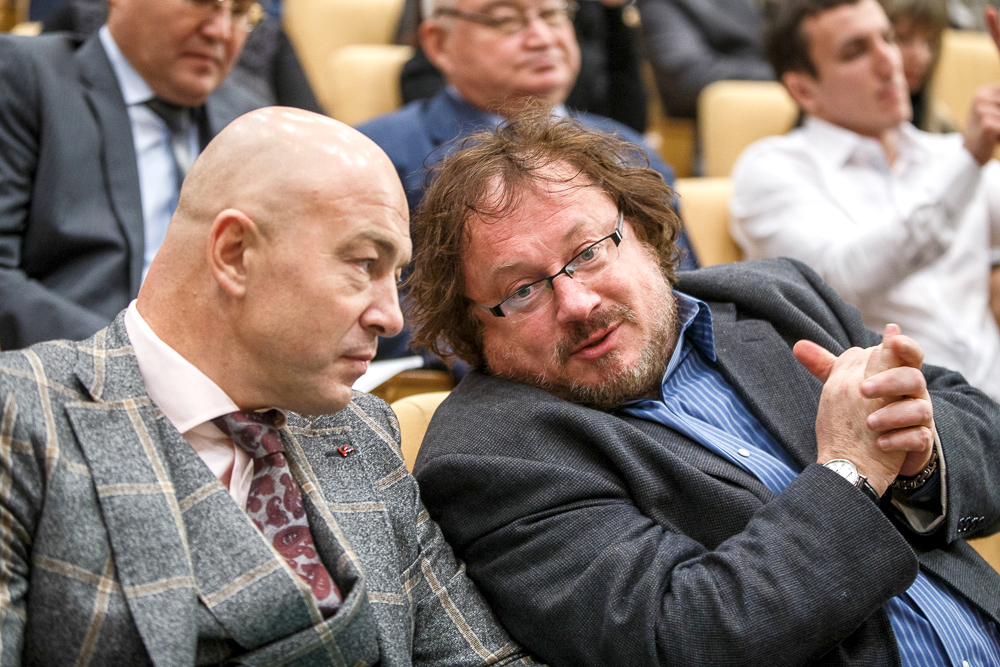
The State Duma Committee on Education hosted a roundtable entitled “The Russian World in Global Civilizational Processes” with the participation of the Russkiy Mir Foundation Tuesday, 27 October.
Among the principal speakers at the roundtable were: Vyacheslav Nikonov, Chairman of the State Duma Committee on Education and Chairman of the Management Board of the Russkiy Mir Foundation; Natalya Tretyak, First Deputy Minister of Education and Science; Oleg Smolin, Deputy Chairman of the State Duma Committee on Education; Ludmila Verbitskaya, President of the Russian Academy of Education, President of MAPRYAL and Chairperson of the Board of Trustees of the Russkiy Mir Foundation; Andrei Petrov, Head of the Analytical Department of the State Duma Executive Office and Secretary of the Russian Historical Society; Lyubov Dukhanina, Deputy Chairperson of the Civic Chamber Commission on Education and Science; Yefim Pivovar, Rector of RGGU; Alexei Gromyko, Director of the Institute of Europe of the Russian Academy of Sciences; Nikolay Zlobin, President of the Center on Global Interests in Washington; Leonid Polyakov, Professor at the National Research University Higher School of Economics; Vladimir Kochin, Executive Director of the Russkiy Mir Foundation; Oleg Novikov, Director General of the EKSMO publishing house; and Oleg Airapetov, Professor of the Faculty of Public Administration at the Lomonosov Moscow State University.
Vyacheslav Nikonov, Chairman of the State Duma Committee on Education, Chairman of the Management Board of the Russkiy Mir Foundation and Doctor of History, presented his new book Civilization Code. What Awaits Russia in the Future World?, followed by a discussion on genesis, aspects and problems of the interaction between the main centers of the modern world and their development patterns, as well as Russia’s role in the global processes.
Russia is No West
Vyacheslav Nikonov’s book is an attempt to discern the civilizational roots of Russia. “We’re used to seeing the world from a West-centric perspective,” the historian believes. “Understanding one’s civilizational nature is essential to understanding the world one lives in.”
In his book, the author discusses the events and challenges that Russia encountered throughout its history, largely defining its civilization code. Mr. Nikonov considers the fact that Russia adopted Christianity through the Byzantine Empire, and not ancient Rome, the crucial event that “programmed” the Russian history. The author notes that with this, Russia joined the more advanced civilization center in the 10th century. Mr. Nikonov considers the age of Tatar rule as a factor that, on the one hand, thwarted progress. One the other hand, it was thanks to Pax Mongolica that the future Russia adopted many accomplishments of the great Chinese civilization, and it was that feeling of being part of an enormous world that gave rise to the Russian Empire. Rus faced many other difficult challenges aside from its neighbors and the nomad tribes, like a very harsh climate.

All of this shaped the code of the Russian civilization, making Russia so vast, multi-ethnic and multi-confessional, and its rulers so determined in its sovereignty. It also laid the foundation for the unique values of our civilization: freedom, understood as will instead of democracy; justice, which is not strictly thought of as rule of law, but is closer to existential notions of truth and conscience.
“Russia is certainly no West,” Vyacheslav Nikonov concludes.
“It is a civilization in its own right.”
Speaking about the Russian World, the political expert said that it is often presented as a geopolitical construct aimed at justifying Russia’s interference with others, but in fact, “the Russian World is not a geopolitical project. It is a global civilizational community defined by a sense of belonging.” Those who do not consider themselves part of the Russian World do not belong to it.
“The Russian World lives on as long as Russia exists. This is why I think it extremely important that Russia preserves its Russian-ness, which is in fact multi-ethnic, multi-confessional, multi-cultural and multi-lingual. It is a symbol of our national unity, which is why the Assembly of the Russian World takes place on the eve of the National Unity Day. Allow me to wish you all a happy holiday!” Vyacheslav Nikonov said.
Uniting the Russian World is a Fundamental National Goal
Oleg Smolin noted in his following speech that the idea of uniting the Russian World was still viable, at least in part. “The process of uniting the Russian World with Russia at its center will continue,” he said.
The importance of this endeavor was mentioned by other members of the roundtable as well.
Historian Yefim Pivovar contested Mr. Nikonov’s claim that the Russian World was formed as a result of geopolitical catastrophes of the 20th century. He recalled the Cossacks, who moved to Turkey but didn’t lose their Russian identity, and Alexander Herzen. Mr. Pivovar argued that new challenges were very difficult, but history shows that it is possible to unite the Russian World.
 Andrei Petrov
Andrei Petrov argued it was time to move from theory to practice in a number of concrete steps.
“I’m speaking about politics, economy, culture, language,” he said, noting that the Russian Historical Society considered its cooperation with the Russkiy Mir Foundation a priority. He talked about the upcoming 100th anniversary of the October Revolution, which will take place in 2017, and stressed that the unification of the Russian World should become a true civic and ideological reconciliation.
Nikolay Zlobin, President of the Center on Global Interests in Washington, also said that this issue was very complex yet important: “I am a big fan of the Russkiy Mir Foundation, I have a lot of respect for this organization... The Russkiy Mir Foundation is destined to meet a challenge of historical proportions for Russia. Historical reconciliation was mentioned here. It is, in fact, a very long and difficult process, a fundamental national challenge for Russia: To unite the Russian World. It’s not about uniting Russian-speaking people, but creating a union of Russian-language, Russian-speaking, Russian-thinking, Russian-cultured peoples.”
On Education
Many speakers talked about the educational value of the book written by Vyacheslav Nikonov. Notably, Natalya Tretyak, Lyubov Dukhanina and Leonid Polyakov argued it could be used in schools and universities. Moreover, there is a large social demand for books of this kind today.
“The girls and boys of today have a serious question: What will Russia look like in the future? What Russia will they live in? This is why one of the challenges facing our educational system is finding an answer to the question on what the world order will be and who will be the leaders of this world. This book lays the groundwork with regard to this matter, and a thoughtful student could use it in the search for self-identity to answer some of these questions,” Lyubov Dukhanina noted.
According to professor Leonid Polyakov, the book is a natural complement to the European and Russian intellectual tradition of “deciphering Russia” that started as far back as in the 18th century. He went on to mention such predecessors of Mr. Nikonov as Danilevsky, Toynbee, Spengler and Huntington, noting that Mr. Nikonov’s research could be seen as a new perspective on the subject rather than a conclusion to the debate. “After all, a code is always a riddle,” Mr. Polyakov said.
Contribution to a New World
 Oleg Novikov
Oleg Novikov, Director General of the EKSMO publishing house that published
Civilization Code, noted that he considered every book a unique means of uniting the Russian World. He said that infrastructure for translating the Russian culture, including the classical Russian literature like the works of Pushkin, Dostoyevsky and Tolstoy that Russia is largely associated with around the world, was already in place. He considered the Russian Centers, Rossotrudnichestvo offices, Russkiy Mir Assemblies and similar events part of this infrastructure.
Alexei Gromyko, Director of the Institute of Europe of the Russian Academy of Sciences, noted how fortunate it was that the millennia-old Russian civilization did not fade away like many others. “The Russian civilization certainly has a future,” he said, adding that the fate and fortune of the Russian World in the 21st century depended on its adaptability and its contribution to the new polycentric world.
Ludmila Verbitskaya, President of the Russian Academy of Education, President of MAPRYAL and Chairperson of the Board of Trustees of the Russkiy Mir Foundation, noted that the book was written in exquisite Russian. She argued that while the Russian World was a global community, she thought that the mastery of Russian should become an attribute of this community.
Vladimir Kochin, Executive Director of the Russkiy Mir Foundation, gave the final speech at the event. He spoke about the activities of the Foundation and the 9th Assembly of the Russian World which will take place on 3-4 November 2015 in Suzdal. He noted that Suzdal was the final resting place of Dmitry Pozharsky, who had taken part in the events commemorated on the National Unity Day. He also said that, despite the complex geopolitical situation, the Foundation was in full operation. ”We haven’t lost anything. The Russkiy Mir Foundation does not control anything, we have no-one but partners around the world.” Mr. Kochin went on to say that those partners, with some minor exceptions, continued their cooperation with the Foundation.

 The State Duma Committee on Education hosted a roundtable entitled “The Russian World in Global Civilizational Processes” with the participation of the Russkiy Mir Foundation Tuesday, 27 October.
The State Duma Committee on Education hosted a roundtable entitled “The Russian World in Global Civilizational Processes” with the participation of the Russkiy Mir Foundation Tuesday, 27 October.  All of this shaped the code of the Russian civilization, making Russia so vast, multi-ethnic and multi-confessional, and its rulers so determined in its sovereignty. It also laid the foundation for the unique values of our civilization: freedom, understood as will instead of democracy; justice, which is not strictly thought of as rule of law, but is closer to existential notions of truth and conscience. “Russia is certainly no West,” Vyacheslav Nikonov concludes. “It is a civilization in its own right.”
All of this shaped the code of the Russian civilization, making Russia so vast, multi-ethnic and multi-confessional, and its rulers so determined in its sovereignty. It also laid the foundation for the unique values of our civilization: freedom, understood as will instead of democracy; justice, which is not strictly thought of as rule of law, but is closer to existential notions of truth and conscience. “Russia is certainly no West,” Vyacheslav Nikonov concludes. “It is a civilization in its own right.” Andrei Petrov argued it was time to move from theory to practice in a number of concrete steps. “I’m speaking about politics, economy, culture, language,” he said, noting that the Russian Historical Society considered its cooperation with the Russkiy Mir Foundation a priority. He talked about the upcoming 100th anniversary of the October Revolution, which will take place in 2017, and stressed that the unification of the Russian World should become a true civic and ideological reconciliation.
Andrei Petrov argued it was time to move from theory to practice in a number of concrete steps. “I’m speaking about politics, economy, culture, language,” he said, noting that the Russian Historical Society considered its cooperation with the Russkiy Mir Foundation a priority. He talked about the upcoming 100th anniversary of the October Revolution, which will take place in 2017, and stressed that the unification of the Russian World should become a true civic and ideological reconciliation.  Oleg Novikov, Director General of the EKSMO publishing house that published Civilization Code, noted that he considered every book a unique means of uniting the Russian World. He said that infrastructure for translating the Russian culture, including the classical Russian literature like the works of Pushkin, Dostoyevsky and Tolstoy that Russia is largely associated with around the world, was already in place. He considered the Russian Centers, Rossotrudnichestvo offices, Russkiy Mir Assemblies and similar events part of this infrastructure.
Oleg Novikov, Director General of the EKSMO publishing house that published Civilization Code, noted that he considered every book a unique means of uniting the Russian World. He said that infrastructure for translating the Russian culture, including the classical Russian literature like the works of Pushkin, Dostoyevsky and Tolstoy that Russia is largely associated with around the world, was already in place. He considered the Russian Centers, Rossotrudnichestvo offices, Russkiy Mir Assemblies and similar events part of this infrastructure.